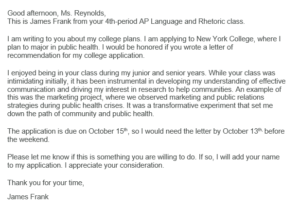When you apply for college, you must ask for letters of recommendation. Now is a good time to learn about what it is and what you need to do to get an impressive letter of recommendation for your college application. Plus, what you learn now will help you ask for letters of recommendation for grad school and jobs after college.
What is in a Letter of Recommendation?
A letter of recommendation is a formal letter sent to a college admissions office, hiring managers, graduate school chairs, and scholarship committees about a candidate’s academic and professional accomplishments.
A letter of recommendation may contain information about a student’s:
- personal and personality traits such as creativity, adaptability, dependability, empathy, perseverance, and character beyond classwork and test scores
- academic achievements
- specific areas of strengths with examples
The recommendation letter answers the question, “who is the student?” A letter of recommendation personalizes your college application, which is why making connections and knowing whom to ask is just as important as the letter itself.
Whom to Ask for a Recommendation Letter
Make sure you read the college or scholarship application carefully so that you ask the right people. When you ask for a letter of recommendation, ask an adult who is not your parent. Choose people who can speak about why you are a strong candidate.
Good people to ask for a letter of recommendation are:
- Current or recent teachers and coaches, especially from your junior and senior years
- Club leaders and mentors
- Employers and managers
- Priests, pastors, and other faith leaders
- Community leaders with whom you have worked or volunteered
How to Ask for a Letter of Recommendation
The first rule of asking for a letter of recommendation is this: Don’t surprise people. You must actually ask first. Make sure to ask for a recommendation letter before adding your teacher, coach, or mentor to your college application. If you feel like you can’t ask before you put down a name, cross that person off your list.
Teachers receive many requests and each has their own process, so make sure to do two things when you are making your list of people to ask:
- Write a list of reasons why you chose that person and the significance of their role in your high school experience, and how it prepared you for college. This exercise will help you organize a list of your achievements and successes.
- Make it about you. Compile a list of achievements or successes to help the person writing your letter. You know why you chose them, but now consider what you did to earn their recommendation. Brag about yourself; this jogs their memory and provides them with a list of concrete examples to use in their letter so it does not read as vague or forced.
Okay, you have your list in hand and now it is time to ask. Here are a few tips to help you ask for a letter of recommendation:
- Ask them directly.
- Choose an appropriate time to ask, and make sure to do so well before the application deadline. Approximately 3 weeks to 3 months before is safe, but it depends on the person you ask. Your favorite teacher gets a lot of requests, so if you ask too late, you won’t get a letter. It is okay to send a reminder as the due date approaches.
- Schedule an appointment to meet with your counselor to discuss the letter. The counselor can give you tips too for choosing people to ask and writing the letters.
- In addition to asking for a letter in person, compose a formal email request. Keep it professional and include your list of achievements that you created before. Make sure to include the deadline in your request, and always thank them for their time.
- Send a thank-you note after you receive the letter.
Here’s an example of what a request looks like.

Many schools will house your transcripts and letters of recommendation is apps such as Naviance. If you apply to schools that don’t use Naviance or something similar, obtain all your letters and transcripts from your counselor, and have them sent to the college or university.
If you need assistance with your college application, talk to your high school counselor, reach out to your high school’s college and career office, talk to caregivers or guardians, or contact SUNY’s Recruitment Response Center.




